by Heather Plett | Jun 14, 2013 | Uncategorized
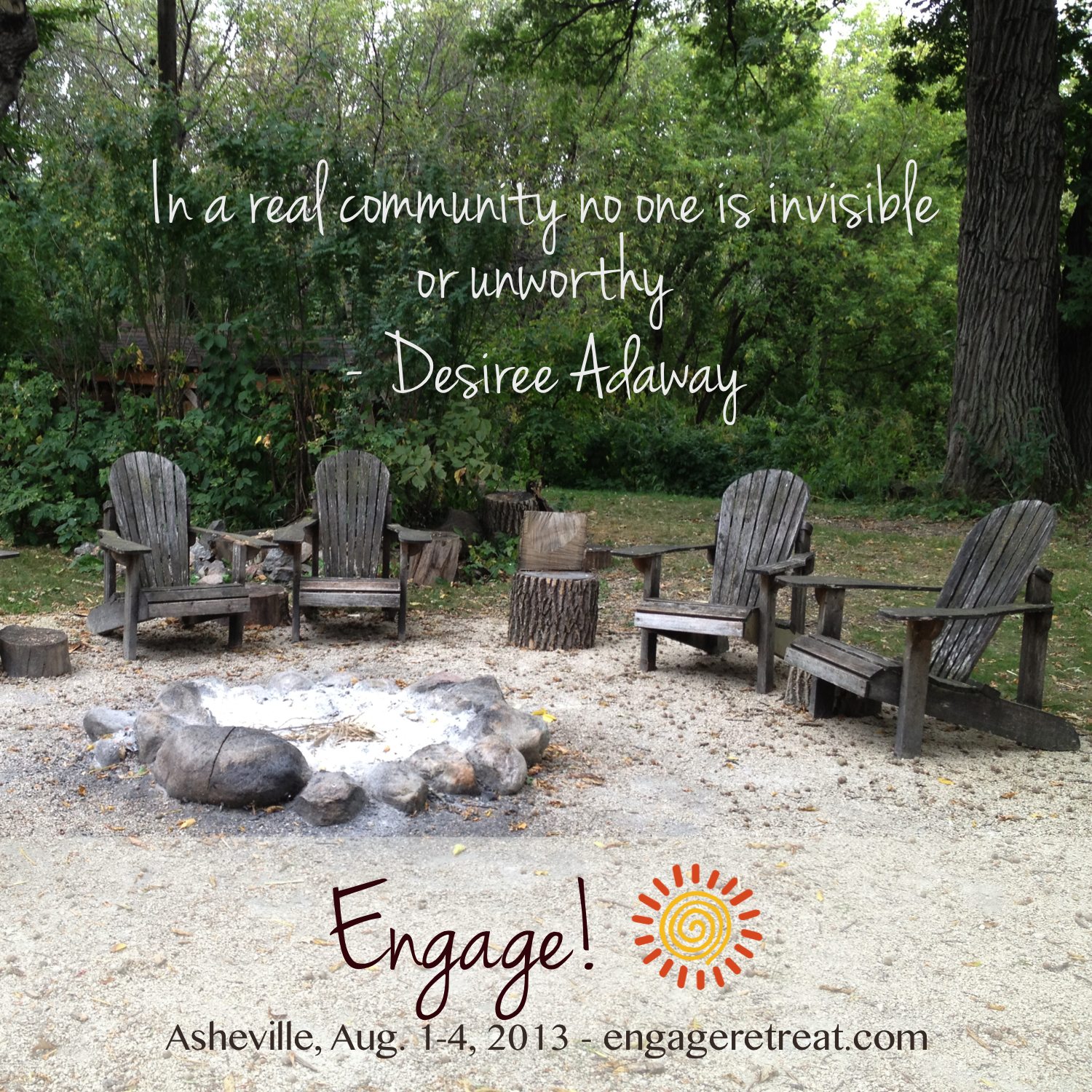
Earlier this week, I was feeling a little discouraged about the “me, me, ME culture” that seems so pervasive in our North American affluence. I wrote a bit about that in my post about all of us being citizens of the world.
Some days, I go through my social media streams, or I stand in a grocery story checkout, and almost all I see are self-focused posts, advertisements, and magazine headlines about how “you deserve to pamper yourself” and “you can make all of your dreams come true” and “you owe it to yourself to buy yourself more things” and “you can manifest abundance and an easy life”.
It makes me want to say what I sometimes say to my children, “It’s not all about YOU!”
Let me say right from the start… self-care is a good and necessary thing, and I am in no way suggesting that you shouldn’t be good to yourself. Many of us struggle with being kind to ourselves, so I understand the importance of reminding people to take care of themselves. I do this often in my courses, workshops, and coaching sessions. I was raised by a mother who modelled self-sacrifice and self-deprecation, so I know how hard it can be to honour ourselves.
The problem is, many of us replace self-care with self-centredness. We justify selfishness – buying ourselves extravagant and wasteful things, doing things that harm the earth, and ignoring other people in our communities – because we believe that we deserve it. In doing so, we isolate ourselves and we marginalize others.
We forget that we need community. We forget that we need to serve each other. We forget that in all of our lives, there will come a time when we will need to rely on the compassion and kindness of other people. My broken foot this week is reminding me of just that – I need people to do many things for me that I would normally do myself.
After the discouragement earlier this week, I started reading various stories coming out of Gezi Park in Turkey that gave me renewed faith in humanity. What began as a protest against the destruction of the park has grown into so much more. People are standing up to police brutality to protest the way that the concerns of common citizens are ignored by their government. In the process, they have created a beautiful community where they share food, make art, do yoga, look after each other, and dance.
One of the most beautiful stories I read was that of the mothers who showed up to form a human chain between the protestors and police after the Prime Minister told them to take their kids out of the park to protect their safety. I was so moved by that story, in fact, that I created a Facebook group to represent a virtual chain of mothers who stand in solidarity with those mothers.
What I love about these stories is the fact that they show that, at our hearts, we are a communal and compassionate people. When there is need among us, we show up for each other. When someone else is threatened, we stand united against the threat. This doesn’t just happen in Turkey – it happens in all parts of the world.
In the Art of Hosting work, there is something called the Four Fold Practice, which teaches that wholeness in this work (and in our lives) comes when we commit to each of the four practices:
- Be Present and cultivate a strong practice of hosting yourself.
- Participate in conversations with deep listening and contributing from the heart
- Host others with good process
- Co-create a way forward together
This is a beautiful reminder that, to live in community and in a world that needs each of us to show up and offer our gifts, we must host ourselves, participate actively, host others, and co-create a way forward. None of these can stand alone, and none of these is a complete picture. Unless you host yourself, you cannot offer deep listening to others, nor will you be prepared to host others.
I created this mandala awhile ago, playing with the idea that all four of these practices are connected, that there is a flow and an interdependence among them as we learn to work with our own gifts and the gifts of others, and that they are all part of what it means to be in circle with each other.
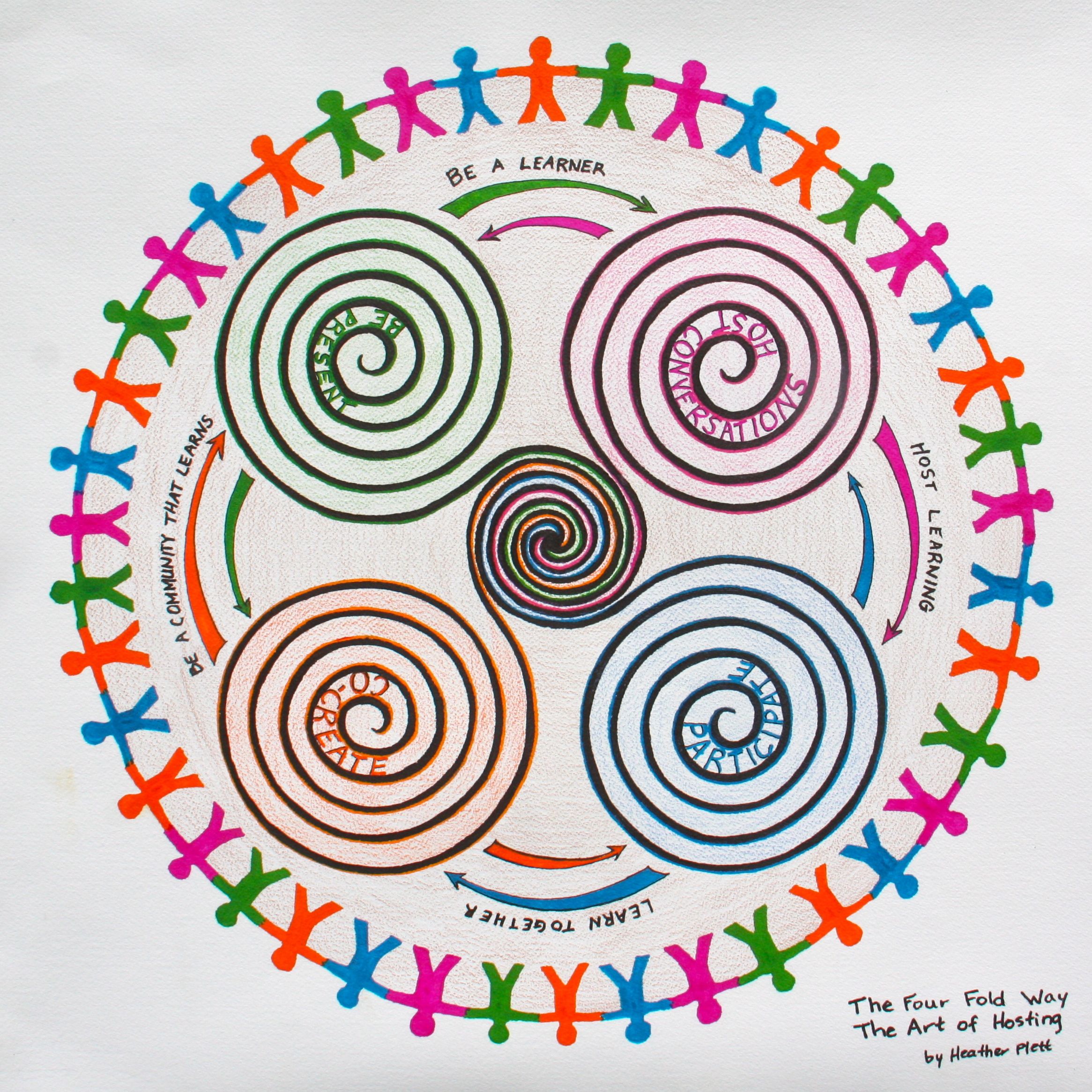
The more I do this work, the more I know that it is imperative, paradigm-shifting work. We cannot continue to function in a self-centred world, nor can we function well if we fail to care for ourselves or others. We need to rely on each other, but we also need to recognize our own strengths.
If you want to learn more about this, you’re welcome to attend a one-day introductory workshop on The Art of Hosting and Harvesting Conversations that Matter that I’ll be co-hosting in Winnipeg on July 24th.
by Heather Plett | Jun 6, 2013 | Uncategorized
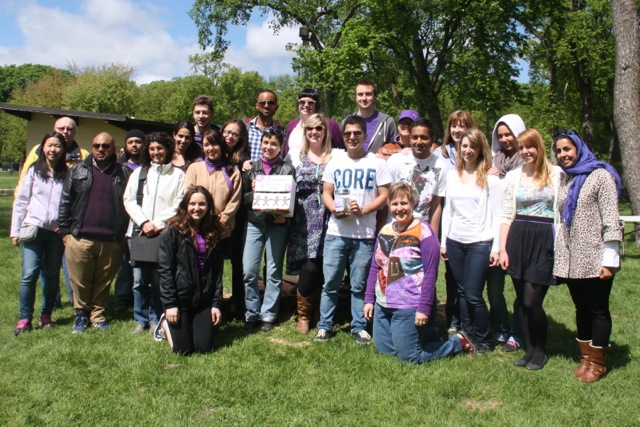
Standing in the park on Saturday, surrounded by my students after the Stand Up Super Games, I got a little choked up. I was immensely proud of this great group of students who’d pulled together, despite some of the rough spots they’d been through, to create a great event for a good cause.
Yes, the students had initiated the event because their assignment in the PR class I teach is to create some kind of PR campaign, but the energy they put into organizing it and fundraising for Osborne House showed that it had become so much more than an assignment; it had become a cause. Most of them showed up in that park not just because they wanted to pass the course, but because they cared for the women taking shelter at Osborne House due to domestic violence.
In showing up for a cause that they care about, my students were demonstrating that they are citizens of the world and they are doing their part in trying to make it better.
In his book, The Abundant Community, Peter Block talks about the difference between citizens and consumers.
“A citizen is one who is a participant in a democracy, regardless of their legal status. It is one who chooses to create the life, the neighbourhood, the world from their own gifts and the gifts of others. A consumer is one who has surrendered to others the power to provide what is essential for a full and satisfied life. This act of surrender goes by many names: client, patient, student, audience, fan, shopper.”
Sadly, there is a tendency in our culture to forget what it means to be citizens and to focus instead on our rights and entitlement as consumers. A recent news story about a man who refuses to mow the lawn on the boulevard in front of his home demonstrates that tendency. He believes it is “the city’s” responsibility to mow that piece of grass, forgetting that “the city” is each and every one of us who live here and that we all have responsibility to care for the place in which we live.
This man is not alone in his sense of entitlement and lack of commitment to the world around him. How often have you heard people complaining about the government, when they do very little to lobby the government for change and often don’t even vote? How often have we ignored the fact that our neighbours may be struggling with poverty or oppression because it’s “not our problem”? How many times do we ignore the damage being done to our earth because we assume we deserve the creature comforts that are produced from the earth’s limited resources?
As a friend living in Haiti reminded me on Facebook this morning when I ranted about this issue, this is the “tragedy of the full belly”. When we have too much, we expect too much. When we become self-reliant, we assume we don’t need other people and that they don’t need us. We stop contributing to our communities because we can get along just fine without them. And when we stop being community-minded, it becomes less and less important how our actions impact the people around us.
That’s why I got emotional when I was standing with my students in the park. In showing up for this campaign, they demonstrated that they haven’t forgotten about the need to contribute to their community. They’re willing to step out of their own comfort zones, forget about their own entitlements, and serve a cause that is bigger than them. This is what we need to foster more of in our schools and work places. This is leadership.
Meg Wheatley defines a leader as “anyone who is willing to show up and help”. Leaders, in other words, are those people who remember their citizenship and are willing to be part of a larger community. The students who contributed to the Stand Up Winnipeg campaign are willing to stand up and be leaders.
The more I do this work, the more I feel passionate about the need for us to stop being so focused on ourselves and our entitlements and start serving as citizens and stewards of the world. That’s why I’m so excited about the three upcoming events I’ll be co-hosting this summer.
On July 6, I’ll be in Ontario co-hosting Ignite: A day of retreat for women sparking change. On July 24, I’ll be in Winnipeg co-hosting The Art of Hosting and Harvesting Conversations that Matter. And then on August 1-4, I’ll be in Asheville, North Carolina, co-hosting Engage! A retreat for women with love in their hearts and fire in their veins.
All of these events are designed for people, like my students, who want to stand up and be counted, people who are willing to be citizens of the world, people who understand that communities thrive when each person shows up and makes a contribution.
These events are not about the old understanding of the leader as a hero, they are about a new understanding of the leader as a host. A host shows up and makes people feel comfortable. S/he engages people in meaningful conversation. S/he makes sure there is good food to eat. S/he is a steward of the place in which she lives. S/he builds community, not from the front of the room but from a place in the circle.
STAND UP now, and let’s make the world a better place.
by Heather Plett | Apr 30, 2013 | Leadership, Wisdom, women
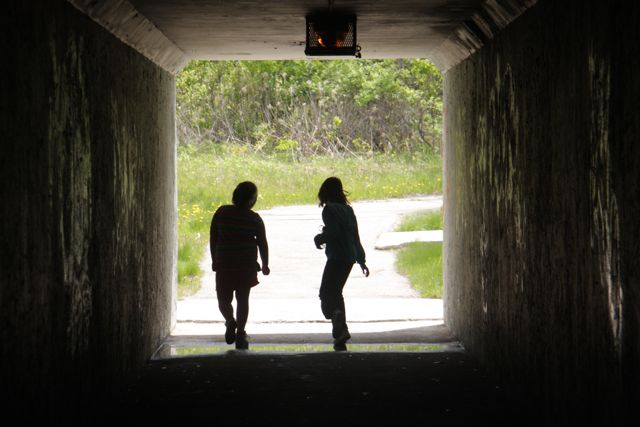 I’m a statistic. I’m one of the women Sheryl Sandburg and others talk about who don’t, in their opinion, help the cause of feminism. I made it all the way to the glass ceiling, peered through the cracks, decided I didn’t like what I saw, and walked out. I’m a “walk out who walked on.”
I’m a statistic. I’m one of the women Sheryl Sandburg and others talk about who don’t, in their opinion, help the cause of feminism. I made it all the way to the glass ceiling, peered through the cracks, decided I didn’t like what I saw, and walked out. I’m a “walk out who walked on.”
There’s a pretty good chance I would have made it through that glass ceiling if I’d “leaned in” long enough. I had all of the credentials and was an ambitious up-and-comer at the time. I took the fast track through the ranks of the public service, had the title “director” added to my name, got the office right next to the corner office, and was making more money than I’d ever dreamed I could.
On top of the career, I had a good feminist husband who carried his share of the household and parenting responsibilities, a couple of beautiful daughters, a house in the suburbs, a minivan, a trailer at the lake, and a boat. You could say I had it all – the feminist’s dream.
And now? I still have the husband and daughters (with an extra one since those days), but I no longer have the trailer at the lake, the boat, the comfortable paycheck or the title of “director” attached to my name. Instead, I have a tiny office in my basement without a window and a fledgling career as a teacher, coach, facilitator and writer.
Some might call me a failed feminist. I let go of the dream that my foremothers fought for. I quit the corporate climb on the wrong side of the glass ceiling. Instead I now spend a good portion of my days creating mandalas with Sharpie markers, hosting story circles, and inviting retreat participants to stitch together quilt squares – not exactly the things a traditional feminist would take pride in.
Why did I walk away from the corporate career and the frequent flyer points in favour of Sharpie markers, quilt squares, and women’s retreats?
There are a few reasons.
- At the height of my career, I had a stillborn son whose presence in my life reminded me that my priorities are not wealth, work, or prestige but rather family, community, and space for spirituality.
- I wanted to find happiness. I knew that the corner office wasn’t my path to happiness.
- I became convinced that it’s time for feminism to grow into something new, and I was pretty sure that I could serve a greater role in helping to birth the new wave of feminism from outside a corporate structure.
It’s that last point that I want to talk about in this article. Instead of a “failed feminist”, I like to think of myself as an “emergent feminist”.
It’s time, I believe, for women to change the world. That won’t happen simply by getting into CEO positions and taking more seats at the boardroom tables. Women will change the world only if we CHANGE LEADERSHIP.
When I was in formal leadership, on my way to the top, I thrived because I learned to think like a man. I listened to the voices of mentors who told me that “feelings have nothing to do with leadership and you should leave them out of the boardroom”, I shut down my intuition in favour of logic, I left my spirituality and much of my creativity at home, I was careful not to be too wild or passionate, and I even started to believe what I was told once that “relationships get in the way of good programming.”
By the time I broke away from formal leadership to start my own business, ten years after being named a director, I was almost completely burnt out from living in a way that was not authentic to me. I returned to the things that made me feel alive – spiritual practices, art-making, wandering in the woods, and relationships – and when I did I realized that THESE THINGS were exactly what had been missing in my leadership practice. More importantly, they weren’t just absent from my own journey, they were missing from leadership in general.
Instead of leaving them at home, I should have clung to them and brought them into my work. Instead of shutting down my feelings and encouraging my staff to do the same, I should have invited them to bring their vulnerability into conversation circles. Instead of creating strategic plans that rarely evoke any imagination, I should have drawn mandalas that wake up the right brain and invite it to the table. Instead of sitting around energy-killing boardroom tables, I should have held staff retreats in the middle of the woods.
For far too long, we’ve accepted a masculine-dominated leadership paradigm in our government offices, our businesses and even our non-profits that is no longer serving us. As Margaret Wheatley and Deborah Frieze say in Walk Out Walk On, we’ve been relying on the leader-as-hero model, when what we really need now is the leader-as-host. In the words of Tina Turner, “we don’t need another hero”. We need people who can lead from a place in the circle, people who can help heal the brokenness in the world, people who help us feel connected again, and people who can remind us of the importance of our relationship with the earth.
“Leadership is about rearranging the chairs, getting the questions right, putting citizens in front of each other and then knowing what’s worth focusing on. The leadership I’m longing for is the leadership that says my number one job is to bring people together, out of exile, out of isolation, and into connection.” – Peter Block
All around us, we see signs of how disconnected we have become – over-consumption of our resources, terrorist attacks, climate change, extreme poverty, etc. These are the stories of a disconnected human race and this disconnection has been fueled by competitive, hierarchical, power-driven leadership that has been allowed to run un-checked.
If the new wave of feminism has a role to play in the world it is not about pushing harder for the corner office, but about bringing us back to a place of connection. Instead of fighting for the top jobs, the power and the prestige, we should be urging our leaders to bring us out of exile and back to community, back to spirituality, back to earth stewardship, and back to ourselves.
Instead of simply fighting to gain entry into the halls of power, we should be working to change the furniture in those halls. It’s time to move the chairs into a circle and open the windows to the world. It’s time to air out the corner office and replace it with conversation spaces. It’s time to replace competitiveness with collaboration, and hierarchy with community.
This is why I decided to walk out and walk on… my role in the world is no longer to fight for power, it’s to help us figure out how to balance power with love. Instead of standing in front of people, I’m sitting beside them and creating space for conversations. Instead of thinking like a man, I’m inviting men to think more like women.
I don’t want the corner office, but that doesn’t mean I don’t want to see a woman there. I will always fight for her right to be there, and when she gets there, I’ll be standing beside her, helping her to take down the walls of her corner office and invite people in. I will urge her to see the world through balanced eyes, honouring both the feminine and the masculine in the world, and creating space for us all to have meaningful conversations that lead the world into the transformation it needs.
I’m now leading from a place in the circle so that I can help other women (and men) learn to do the same. When we’ve gathered into that circle, we can all lean in and listen to each other.
If you’re looking for a new way of defining leadership, join me on a free call on Re-imagining Leadership for our Time on May 1 at 2 pm. Central.
by Heather Plett | Apr 23, 2013 | Leadership, Uncategorized
“I’m finally beginning to realize that I’m a leader.”
Those are the words I heard not long ago from a woman who’d just finished the four month leadership program I was co-facilitating. She was an incredible woman doing great things in her community, including lobbying to save a local nature trail, but she’d never thought of herself as a leader.
I hear those words all the time, especially from women. I’ve been hearing them recently in relation to my online course Lead with Your Wild Heart. “I love your program… but… I’m not sure I’m a leader.” Almost without fail, these women are gifted in art, teaching, community transformation, homemaking, earth stewardship, etc., and yet they don’t see leadership in what they do.
Part of the purpose of Lead with Your Wild Heart is to re-imagine leadership for our time. I believe that the need in the world has changed and that we now need to see leadership through a new lens.
I believe that the leaders the world needs now are those who know how to host conversations, imagine change, paint, dance, sing, write poetry, love generously, live in right relationship with the earth, build community, imagine new ways of using and honouring our limited resources, teach, and play.
As Margaret Wheatley says, a leader is “anyone who is willing to help.” The world needs us to show up and help right now, with whatever gifts we have to offer.
I’ll be hosting a free call on Wednesday, May 1st, at 2 p.m. Central on Re-Imagining Leadership for Our Time.
The call will be an exploration into a new way of defining leadership that fits the paradigm we are now living in. Your questions and ideas on the subject will be more than welcome. One of my deepest beliefs about effective leadership is that it involves hosting meaningful conversations that help surface the wisdom in the circle. Your wisdom is welcome in this circle, and so are your doubts, questions, and curiosity.
I’m happy to be joined in the call by some of the members of my Wise Heart Wisdom Circle. Those who’ve confirmed so far are Desiree Adaway, Julie Daley, and Lisa Wilson.
Sign up below and you’ll receive the call information in your inbox. I look forward to our conversation!
ALSO… over on Facebook, I’m collecting “what if” questions about leadership to inspire us for the conversation. Scroll down below the sign-up form to see the ones already gathered, and add your own to the comments of this post.
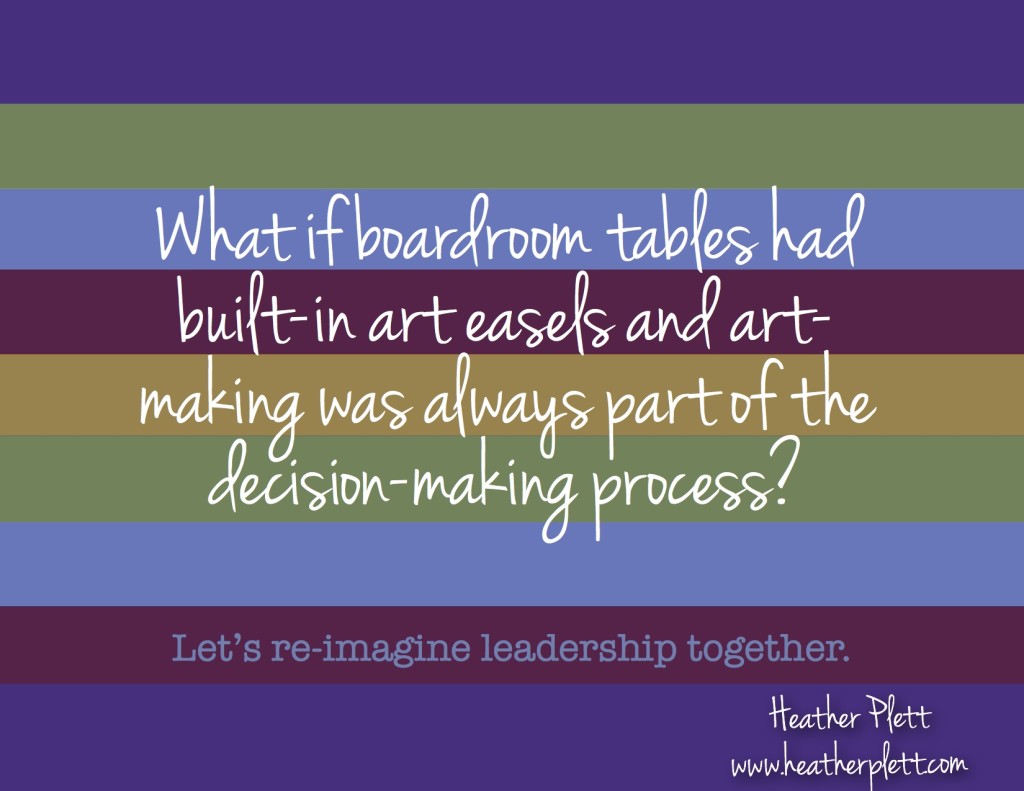
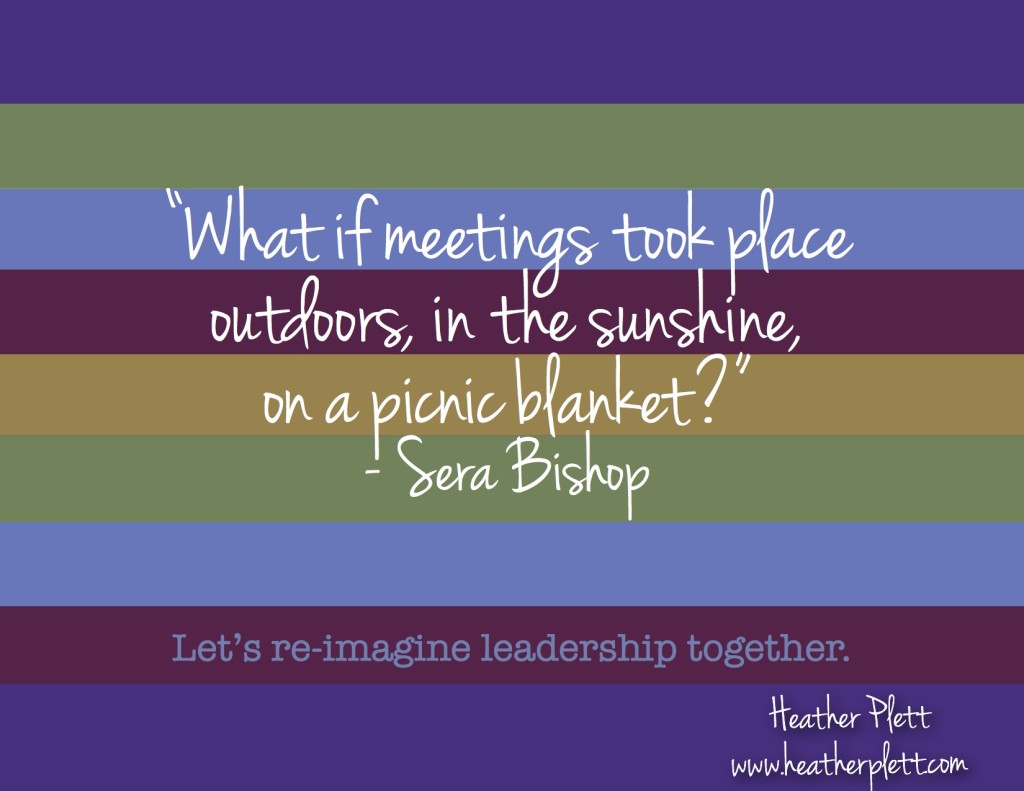
by Heather Plett | Apr 5, 2013 | Creativity, growth, journey, Leadership
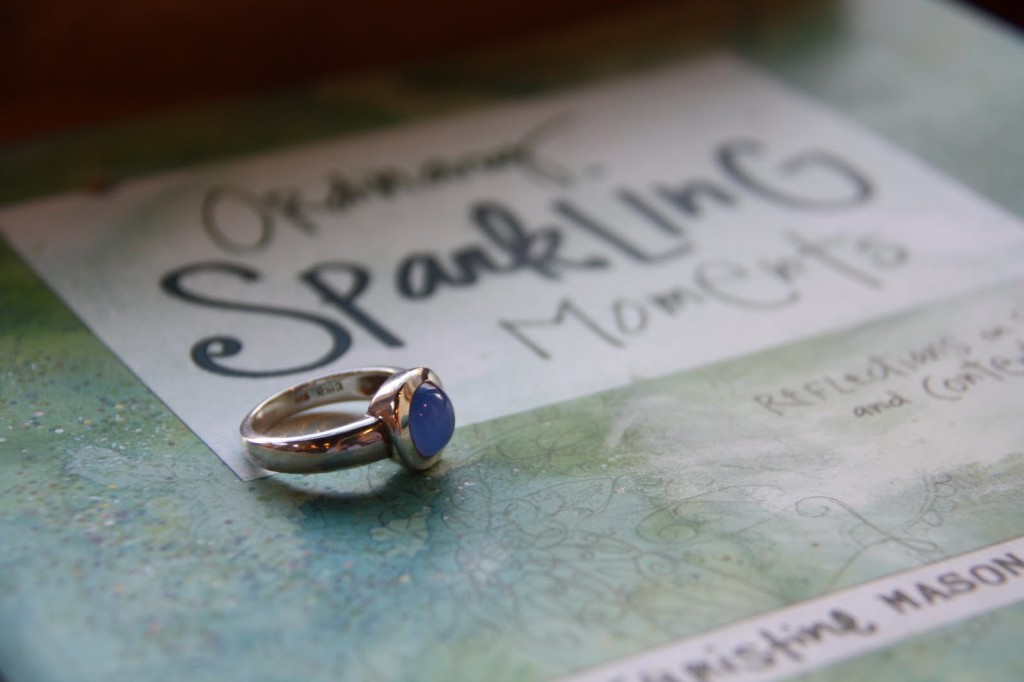
Three and a half years ago, I brought myself a promise ring.
I was visiting Banff at the time, after a business-related road trip through Western Canada. Visiting Banff always brings up mixed emotions for me. I love the beauty of the place, in the middle of the Rocky Mountains, but it holds a sad story from my past. I lived there the summer I turned 19, and it wasn’t a particularly happy summer. I was in that “trying to decide whether to stay safe in life or to take more chances and risk getting hurt” phase of early adulthood. Sadly, I let the things that happened to me that summer convince me that safe was a better option. I gave up the plans I’d had to change schools and move to another province and I went back home to nurse my wounds and play it safe.
One of the places that always brings up deep longing for me is the Banff Centre. When I lived there, my roommates and I sometimes went to watch visiting performers, and each time I went, I’d think “oh, if only I were talented enough to spend time at a place like this!”
When I visited three and a half years ago, I drove past the Centre and started to cry. I cried for the young woman I was more than twenty years earlier who believed she wasn’t talented or worthy. I cried for the hurts that young woman had already suffered and had yet to suffer. I cried for the long journey I’ve had since then, learning to trust both my worthiness and my longings, and learning to be both resilient and courageous through the hard times.
When I drove back into town after visiting the Centre and the resort where I spent the summer cleaning other people’s mess out of hotel rooms, I wandered through the downtown and dropped in at a jewellery store. In a flash of inspiration, I bought myself a promise ring with a blue chalcedony stone. (I later learned that the chalcedony speaks of spirit and trust and is known as the Speaker’s Stone, the stone of one who must measure his words. It encourages reflection and meditation, its gentle radiance preparing us for action but helping to hold back words we might regret. The great Roman orator, Cicero, is said to have worn one around his neck.)
Later that day, I sat in a cafe with my journal and wrote the following promise to myself:
I promise:
– I will take more chances.
– I will believe that I am an artist.
– I will trust my ability.
– I will look for opportunities to paint and make art as often as I can.
– I will sign up for another class or workshop that stretches me.
– I will honour the muse.
I couldn’t go back and make those promises for my 19 year old self, but it wasn’t too late to make them for my 40+ self.
Last week, in the last lesson for Lead with Your Wild Heart, I invited participants to make a commitment to themselves and to honour it with some kind of gift, like a ring. That tweaked my memory and I went back to find the original post I wrote about the promise ring I’d bought for myself. I started crying all over again – not because I was sad anymore for my 19 year old self, but because I am delighted for my 46 year old self that I can honestly say that I have kept my promise to myself.
I have done just what I said I’d do. I took more chances (quit my job and started a business), started making more art and taking art classes, I’ve been honouring the muse, and trusting my own ability.
Nothing to date has felt so much like an honouring of that promise as the creation of Lead with Your Wild Heart. Nothing has felt so much like it is emerging out of my most authentic, most beautiful, most Spirit-guided self.
I’ve just opened registration for the second offering of Lead with Your Wild Heart, and I can say that I am thrilled beyond expectation with how beautifully it has turned out. This has been an exercise in trusting my own wild heart, and I know that it will serve as a gift to all those who take it into their own wild hearts.
And now… can I tell you a little secret? I’m dreaming of taking some version of Lead with Your Wild Heart to the Banff Centre for Leadership Development. I don’t know yet how to make that happen, but I’m sharing the dream in hopes that will help me get closer to it.
I’m trusting my wild heart and seeing where it leads.







